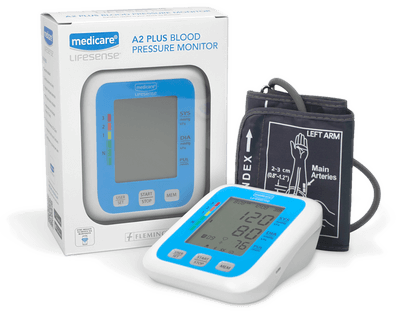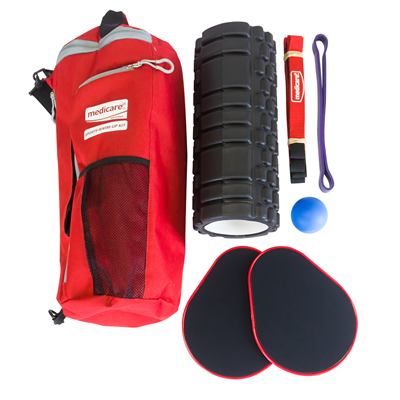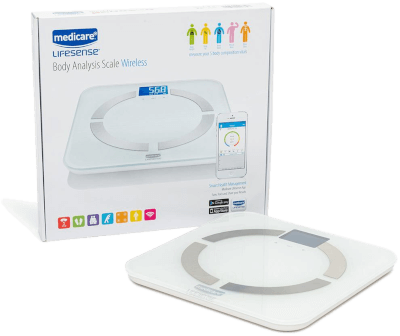
Simple Steps to a

In association with

5 Simple Steps to Keep Your Heart Healthy
We have teamed up with Croí, The Heart & Stroke Charity, to bring you a series of informative training videos on Heart Health.
Listen to the expert tips below on how to keep everything ticking over.
Step 1 - Monitor Your Blood Pressure
Blood pressure refers to the amount of work the heart has to do to push blood through the arteries in order to deliver essential oxygen and nutrients to all parts of the body.
Taking regular blood pressure readings at home can help with early diagnosis of conditions like hypertension (high blood pressure), keep track of your treatment if you are on blood pressure medication and possibly reduce the number of times you need to visit your GP. Having a heart-healthy focus can help prevent stroke, heart attacks and even kidney failure.
Know your numbers: 140/90 or below is considered normal. Consult with your GP or Pharmacist for further information.
 Blood Pressure Monitors
Blood Pressure Monitors

Madeline Rabbit
Croí Nurse Lead
Step 2 - Physical Activity
Physical activity helps to lower your risk of heart disease and stroke by lowering your blood pressure, increasing your ‘good’ cholesterol levels, helping you maintain a healthy weight and by keeping your heart healthy. It’s never too late to begin exercising, the key is to increase your level of activity at a steady rate over time.
Your heart is one big muscle and, like any muscle, it needs to be exercised to stay healthy. Keeping your heart fit and healthy makes it easier to pump blood around your body and makes you feel more energised as well.
Caroline recommends:
- Aim for 150 mins moderate exercise a week
- 10 min bouts 3 times a day will achieve this
- Plan it into week. Make yourself exercise appointments
- Reduce your screen time
- Minimise sitting time and move every 30 mins
- Find an exercise you love
- Recruit a fitness partner
- Include strength & endurance to improve muscle strength

Why not try our Sports Warm Up Kit? Its contents are designed to improve mobility, flexibility and aid muscle activation.

Caroline Costello
Physical Therapist
Step 3 - Diet & Nutrition Check
Following a heart-healthy diet is one of the ways that you can reduce your risk of developing cardiovascular disease. What we eat and drink affects our blood pressure, cholesterol, blood sugar levels and fat stores in our body – all of which are risk factors for cardiovascular disease if not controlled. Therefore, a healthy diet is important for everyone.
Aisling recommends:
- Aim for less than 5g of salt per day
- Reduce alcohol consumption
- Increase intake of fruit & vegetables
- Regularly check your weight & BMI

Did you know our Medicare LifeSense Bluetooth Scales will tell you your BMI?

Aisling Harris
Dietician
Step 4 - Stress Management
Stress Control will teach you these great skills to fight stress (for most of us, a mix of anxiety and depression) and boost your wellbeing. Understanding the sources of your stress can help you respond positively.
Dr. Lisa recommends:
- Practicing Mindfulness
- Exercising regularly
- Share your how you feel with friends
- Making time for loved ones
Dr. Lisa also recommends taking the HSE Stress Control.ie online workshop.
 STRESSCONTROL.IE
STRESSCONTROL.IE

Dr. Lisa Hynes
Health Psychologist
Step 5 - Risk Reduction
Caroline advises on the 5 numbers to know and monitor.
- Blood Pressure: Normal blood pressure for most adults is defined as a systolic pressure of less than 120 and a diastolic pressure of less than 80.
- Cholesterol: Total cholesterol levels under 200 mg/dl are healthy for adults.
- Glucose: Normal blood glucose level (while fasting) range within 70 to 99 mg/dL (3.9 to 5.5 mmol/L).
- BMI: For most adults, an ideal BMI is in the 18.5 to 24.9 range.
- Waist Circumference: Men 37inch women 32inch waist circumference.

Our range of diagnostics products can help you know your numbers and improve your health.
Diagnostics Range
Caroline Dermody
Nurse with Croí
Learn with Medicare LifeSense
Using connected health products and apps, like the Medicare LifeSense app and product range, encourages the maintenance of a healthy lifestyle and empowers you to understand how to best monitor your condition and identify when a visit to a healthcare professional is needed. It can also work as a daily health diary where you can present your stats at a doctor's visit or as use as a reference guide to show progress with your condition or health over time.
The Medicare LifeSense app can help you take control of your health from home. You can track your progress over time and share your readings with your healthcare professional anytime, anywhere. Use with our range of connected devices, input readings from a basic device or one you already have.
Measure
your SpO2, blood pressure, body stats & activity
Track
through the Medicare LifeSense App
Share
with your healthcare professional anytime, anywhere
Reminder
feature for medication or to take a reading

 Fleming Medical UK
Fleming Medical UK


